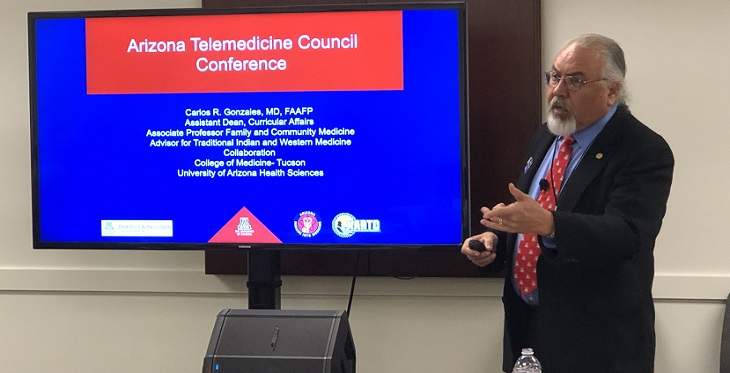After four challenging years as a medical student – while maintaining her roles as a wife and mother of five daughters – Mary Alyson Smith will graduate from the University of Arizona College of Medicine-Tucson, in May. She has decided to pursue a career in pathology, and is especially interested in telepathology, “I feel it’s an area that still has great potential for growth,” she says.
But there’s more to Mary’s medical training. In addition to the usual four years of study, Mary applied and was one of 26 students accepted to the UA College of Medicine’s Rural Health Professions Program (RHPP), designed to broaden students’ knowledge of healthcare delivery by matching them with physician preceptors working in small towns, including Indian Health Service sites, throughout Arizona.
The RHPP was launched with the class of 2000, under the direction of Carol Q. Galper, EdD, then associate professor of family and community medicine, with students doing their first rotation in the summer of 1997. Students can train with physician preceptors in the disciplines of family medicine, internal medicine, medicine-pediatrics, obstetrics and gynecology, pediatrics, and general surgery.
“The RHPP has created physicians who are serving, or have served, substantial time in practice in Arizona, and in rural communities across the country,” Galper says. “With the experiences these trainees have in the RHPP, many of them select residency programs that allow them to have rural experiences and then go on to practice in areas where they can practice at the top of their skill set. The RHPP allows students to learn about the pluses and minuses of practice in a small community, and that can help a community recruit and retain people who know what it takes to practice medicine in a rural community.”
Students who complete their training with the RHPP can continue training in a 16-week Rural Health Distinction Track, which includes rural clinical experiences, during clerkship or transition to residency, choosing one of three concentration areas:
- American Indian healthcare focusing on care provided through the Indian Health Service
- Border healthcare, providing care to people of the USA-Mexico borderlands
- Rural Arizona healthcare
The RHPP was created with the hope that medical students would not only train in rural areas of Arizona, but choose to remain in Arizona as well. Since 1997, 52 RHPP graduates have chosen to practice in Arizona, says Carlos Gonzales, MD, RHPP director.
“I think the RHPP will be ongoing,” he says, “because it has been recognized nationally, and the College of Medicine sees it as a feather in their hat. And they also are aware that we need to improve access to health care, for people living outside of cities.”
Mary Alyson Smith’s experiences with the RHPP and the Rural Health Distinction Track illustrate the broad range of experience the programs offer. Telepathology was not the only field that caught her attention.
“I wrote my RHPP capstone paper on the need to better utilize telepsychiatry, and some suggestions on how I think that would work, in order to coordinate mental health care with primary care providers in rural areas. I am not going into psychiatry or primary care, but I think telepsychiatry, like telepathology, will continue to be a great service in rural areas.”

